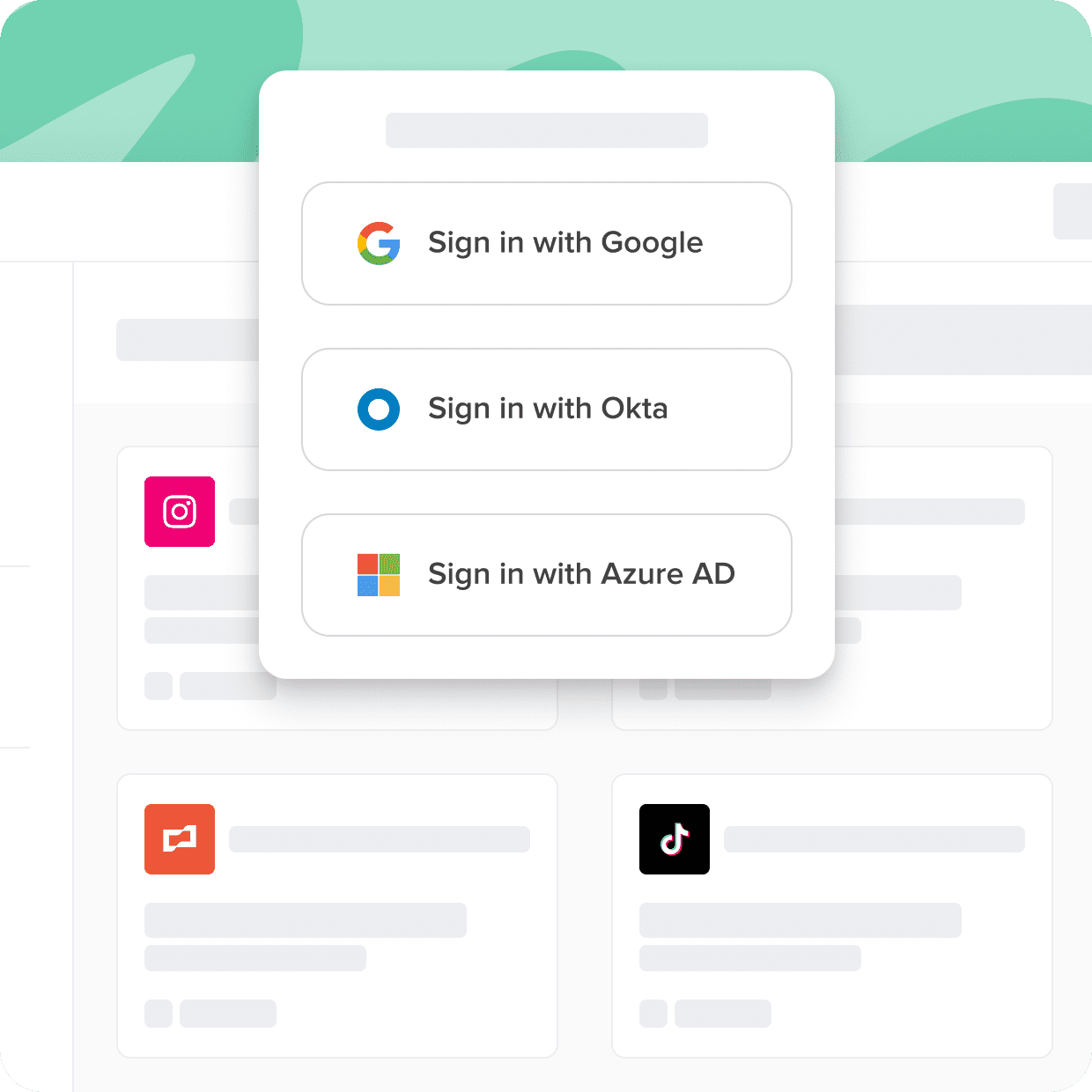Single sign-on (SSO) is a fantastic technology allowing businesses to eliminate password reuse and simplify the login process. Unfortunately, many corporate applications don't support the SSO standard and can't reap all the benefits. The applications that fall into this category are best called "nonfederated." Nonfederated applications are a new category that is becoming increasingly challenging for businesses to manage and secure effectively, yet increasingly critical for businesses to succeed.
Cerby connects all of your apps to your SSO tools, even if they don't support the SSO standard. In this guide, you'll learn about SSO software, the history, and the benefits.
Streamline Access With Single Sign-On
Not all apps are created equal. Some come with security gaps and complexities that can hinder user adoption and put sensitive data at risk. With Cerby, you can ensure secure and seamless access to all your applications, regardless of their support for standards like SSO.
With Cerby You Can

Close the identity gap

Universally enforce 2FA

Eliminate the SSO tax
SSO Tool
In today's enterprise environment, it's essential to have secure and efficient ways to manage user authentication and access to various applications. That's where SSO tools come into play. SSO stands for Single Sign-On, which allows users to authenticate themselves just once and gain access to various applications without having to enter their credentials repeatedly.
However, in an enterprise setting, there are numerous applications that teams and companies use, which means that SSO tools must be compatible with all of them. The most popular SSO providers in the market include Microsoft Azure AD, Okta, and OneLogin. These providers offer a range of features, including integration with various applications, multifactor authentication, and user provisioning.
In addition to commercial SSO solutions, open-source identities and access management solutions like Keycloak and FusionAuth offer an alternative to enterprises that want to have more control over their identity infrastructure. These solutions provide features like user authentication, authorization, and access management and can be deployed on-premises or in the cloud.
One of the most widely used open-source SSO protocols is SAML (Security Assertion Markup Language), which is used by many identity providers and applications to enable SSO. Open-source SAML SSO is a standard protocol for exchanging authentication and authorization data between parties, and it's widely adopted in the industry.
When it comes to choosing an SSO solution, enterprises need to consider various factors such as integration with existing applications, ease of use, security, and scalability. A comprehensive SSO solutions comparison can help organizations make an informed decision and select a solution that fits their requirements. With the right SSO tool in place, enterprises can enhance their security posture, reduce the burden on IT staff, and improve user experience.
How Does Single Sign-On Work?
SSO is a type of authentication method that allows users to log in to multiple applications using just one set of login credentials. This means that users no longer have to remember or enter multiple usernames and passwords – making the login process more convenient and secure. One real-world single sign-on example is Google's implementation of SSO.
When a user logs in to Google's SSO authentication system, they can access all of Google's applications, such as Google Drive, Google Calendar, and Gmail, without needing to provide separate login credentials for each application. Single sign-on providers offer various solutions that businesses can use to implement SSO authentication.
Some popular SSO providers include Okta, OneLogin, and Ping Identity, which offer SSO solutions that work with a wide range of on-premise and cloud-based applications. SSO solutions use protocols such as SAML to ensure secure authentication across multiple applications. In addition to SAML, other protocols include OAuth and OpenID Connect. SAML is a popular protocol used for enterprise SSO, while OAuth and OpenID Connect are commonly used for web-based applications.
SSO providers offer an SSO login portal where users can access all their applications, making it easier for them to work efficiently. SSO providers secure this portal by providing additional features such as multi-factor authentication to prevent unauthorized access. Overall, single sign-on authentication simplifies the login process for users by allowing them to access multiple applications using just one set of login credentials. This not only saves time but also enhances security by reducing the need for users to share their passwords across multiple applications. With single sign-on solutions, businesses can enjoy the benefits of seamless and secure authentication across multiple applications, ultimately resulting in a more streamlined and productive workflow.
This results in time saved for users and simultaneously significantly reduces the risk of password-related security breaches. The challenge, however, is that many applications don’t support the necessary security standards to work with SSO—namely, the security assertion markup language (SAML). Nonfederated applications are a serious security risk, and research from the Ponemon Institute found that they make up a statistically significant percentage of breaches.
SSO Solutions
Enterprise organizations are constantly looking for ways to improve their security and productivity while simplifying user authentication and authorization. This is where SSO solutions come into play. SSO tools allow team members to access multiple applications and services using one set of login credentials, making the login process more streamlined and secure. These tools work by creating a trust relationship between the identity provider (IdP) and the service provider (SP). The IdP is responsible for authenticating the user, while the SP relies on the IdP for user identification and authorization. When a user tries to access an application or platform, they are redirected to the IdP, where they enter their credentials. Once authenticated, the IdP sends a token to the SP, granting access to the requested resource.
For technical and security teams in enterprise organizations, SSO tools provide a centralized way to manage user authentication and authorization across multiple applications and platforms. This reduces the risk of security breaches and saves time by eliminating the need for users to remember multiple usernames and passwords. These solutions are designed to work with a wide range of on-premise and cloud-based applications. Any SSO providers list would likely include major industry players like Okta, OneLogin, and Microsoft, which offers its own single sign-on solution called Azure Active Directory.
Azure Active Directory provides secure and seamless access to Microsoft's suite of productivity and collaboration tools, such as Office 365, SharePoint, and Dynamics 365. In addition to commercial SSO solutions, open-source SSO solutions are also available. These solutions offer businesses the flexibility to customize their authentication process and integrate it with their existing technology stack.
Some popular open-source SSO solutions include Keycloak, LemonLDAP, and Gluu. These solutions offer technical teams more control over the authentication process and make it easier to integrate different applications with SSO authentication. Moreover, SSO solutions also aid security teams. These teams often need to manage access to sensitive data across different applications while ensuring that access is only granted to authorized personnel.
SSO Service Provider
An SSO service provider is a company or organization that offers a platform for managing SSO authentication across multiple applications. There are various SSO providers available in the market. These providers provide several benefits, including enhanced security, ease of use, and improved productivity. When compared to an identity provider, an SSO service provider is unique in that it manages access to multiple applications, whereas an identity provider typically focuses on authenticating user identities. Additionally, using an SSO service provider reduces the need for password management and improves user experience.
One of the main features of an SSO service provider is the use of the SAML protocol to facilitate the exchange of user credentials across multiple trusted domains. For instance, service provider-initiated SSO allows users to access an application without the need to provide their login credentials explicitly. Instead, the user's identity is transferred between participating applications via the service provider.
One SAML service provider example would be Salesforce. Their system relies on SAML to manage user access. There are many SSO providers on the market today. When choosing an SSO provider, organizations should consider factors such as security, cost, ease of use, and scalability. Some popular SSO providers include Okta, OneLogin, and Ping Identity. An SSO providers list can be a useful resource for organizations that are evaluating different providers. Your choice of SSO provider will depend on the specific needs and requirements of the organization.
Best SSO Providers
When choosing an SSO provider, businesses should carefully evaluate their needs and use cases to ensure they select the best solution. There are several key factors to consider when choosing an SSO provider, including security, user experience, and compatibility with existing systems. Companies should also consider the provider's reliability, scalability, and ease of use.
When it comes to closed-source options, the SSO provider Google offers SSO tools that can be used across their suite of products. Okta and OneLogin are two of the best SSO options for small businesses, offering a range of features at affordable prices. In some cases, businesses may prefer to use the best SSO providers open source. These offer more granular control over the SSO process. Keycloak and Gluu are two of the best open-source SSO providers, providing a range of authentication options and enterprise-grade security features.
When making an SSO provider comparison, companies should look for a provider that offers the right balance of features, compatibility, and security. It's also important to consider factors such as support and user training and the provider's history of resolving issues and addressing security vulnerabilities.
Choosing the right SSO provider is critical for businesses that want to streamline authentication and maintain security across multiple applications. By carefully evaluating their needs and considering factors such as security, user experience, and compatibility, companies can select the best SSO provider for their particular needs. Popular SSO providers are Google, Okta, OneLogin, Keycloak, and Gluu. A thorough SSO providers list and comparison can help businesses make an informed decision.
